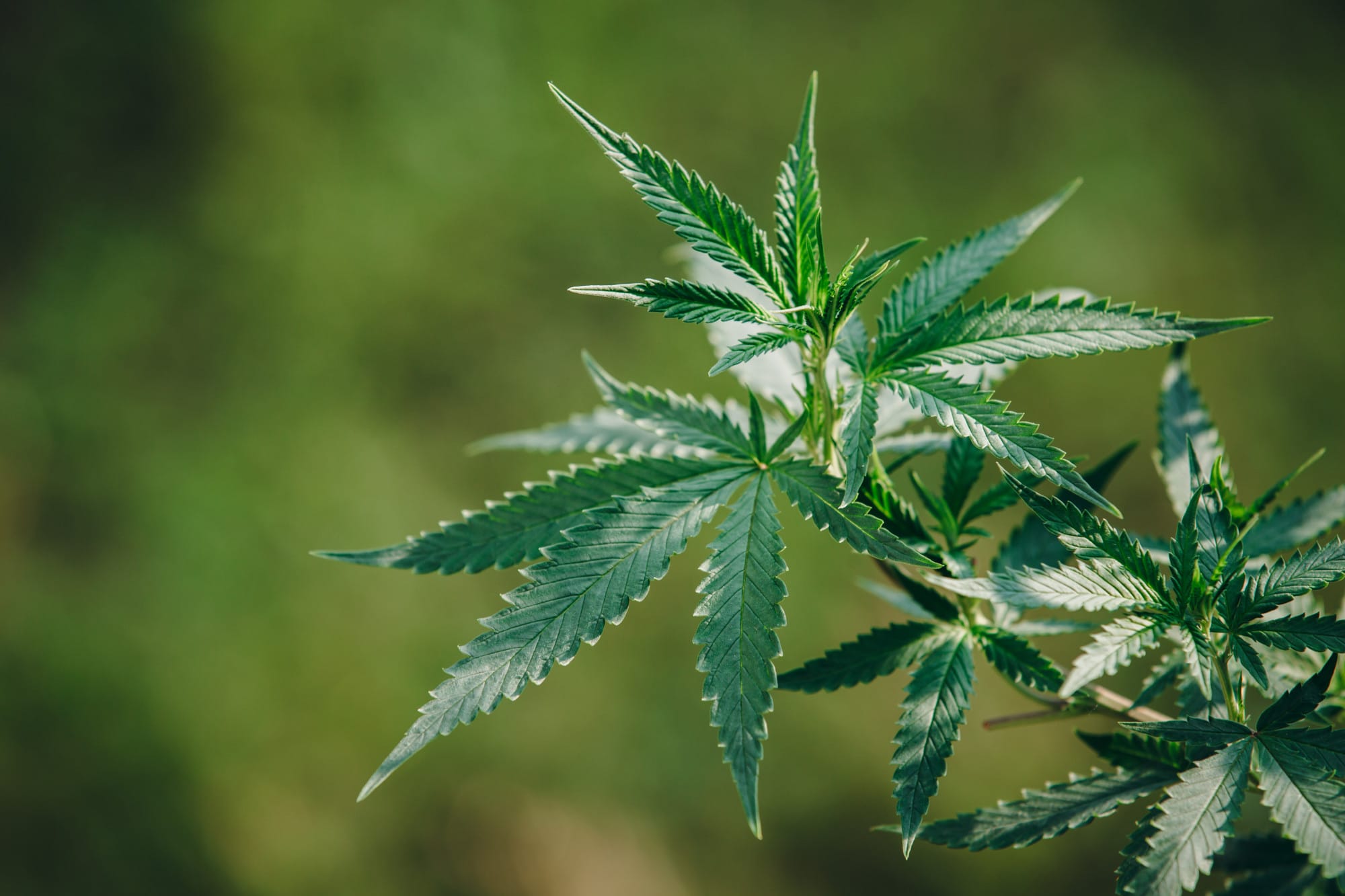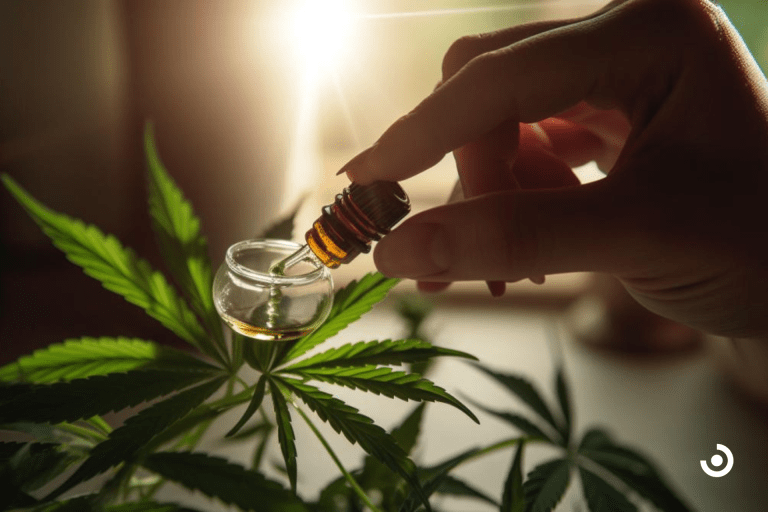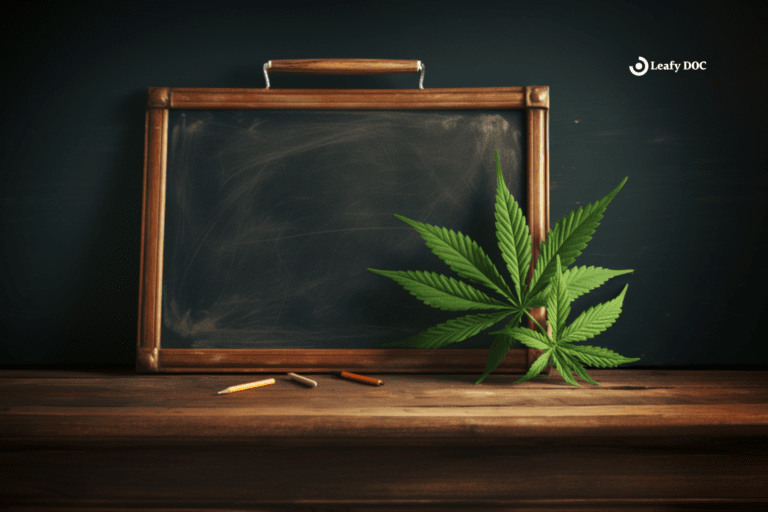What Are The Benefits of CBG?
by Haley Mills · October 26, 2022
CBG is a non-intoxicating cannabinoid that is known for its therapeutic benefits.

The cannabis industry is seeing more and more cannabinoids come through the market in different products like vapes, concentrates, and edibles. If you’ve seen CBG products in your local dispensary, you may wonder what it is and if you should try them.
While we recommend always discussing new cannabis products with experienced budtenders and your MMJ healthcare provider, we can provide insight on this newly-popular cannabinoid and how CBD and CBG compare below.
What is CBG?
Cannabigerol (CBG) is a cannabinoid obtained from young cannabis plants. All other cannabinoids are derivatives of cannabigerolic acid (CBGA), which is an acidic form of CBG. Commonly seen cannabinoids include cannabidiol (CBD) and delta-9 tetrahydrocannabinol (THC).
CBG is found in smaller quantities, and in most strains, just one percent of CBG can be seen compared to twenty to thirty percent of CBD or THC content. Cannabis products derived from Cannabigerol cannabinoids are hard to come by and are usually very expensive. However, CBG is becoming more popular recently due to its medically researched health benefits.
What is a Cannabinoid?
Cannabinoids are found in the cannabis plant and are produced naturally by the human body. We have an endocannabinoid system (ECS) that internally produces cannabinoids. These compounds are quite crucial to maintaining internal balance through many different body systems.
Cannabinoids interact with our ECS to help maintain functional balance through a system of messenger molecules and receptors. Sleep, energy, cardiovascular function, reproduction, stress, chronic pain, motivation, appetite, digestion, and more are some of the body functions that cannabinoids impact.
The two most commonly known cannabinoids found in cannabis are tetrahydrocannabinol (THC) and cannabidiol (CBD). The word cannabinoid can refer to THC or any chemical that acts on cannabinoid receptors.
Cannabinoids vs. Terpenes
Cannabinoids and terpenes are both active chemical compounds found in cannabis plants. While cannabinoids are considered primarily responsible for the euphoric effects and medicinal benefits associated with cannabis Sativa, terpenes remain the source of the cannabis plant’s aroma and taste.
However, when cannabinoids and terpenes combine, they create a synergistic effect on the human endocannabinoid system. The two complement and enhance the sum of their therapeutic or euphoric properties.
How is CBG made?
CBG is derived from younger cannabis plants because they contain the highest amounts of this particular cannabinoid. The levels drop significantly as the cannabis plant gets older. Some specific strains have higher CBG content than others and are specifically cultivated to produce higher quantities than other cannabinoids.
Both CBD and THC begin as CBGA, an acidic form of CBG. In fully developed cannabis plants, you’ll typically find lower concentrations of CBG because most of the CBG is converted to CBD and THC as the plant matures. Due to the difficulty of getting CBG, cultivators are cross-breeding and genetically modifying marijuana plants to help produce more CBG.
What are the effects of CBG?
Cannabigerol (CBG) is a cannabinoid. Cannabinoids essentially mimic the body’s endocannabinoid system, such as anandamide. Anandamide is a fatty acid that activates the receptors. Cannabinoids bind themselves to fat-soluble molecules to enter a cell’s lipid bilayer.
Cannabinoids attach themselves to CB1 and CB2 receptors.
CB1 receptors are found in the areas of the brain that control pain perception, movement, memory, cognition, emotion, and autonomic functions. CB2 receptors are typically found in immune system cells. When the proper connection between cannabinoid and receptor is made, the body is stimulated to have a specific response.
CBG works by binding to both cannabinoid receptors, where it’s thought to strengthen the function of anandamide. This neurotransmitter enhances pleasure and motivation, regulates appetite and sleep, and alleviates pain.
Can it get you High?
No, the CBG that cannabis plants produce won’t get you high. CBG is a non-psychoactive minor cannabinoid. CBG interacts with the psychoactive compound (THC) to offset its effects.
Is CBG Legal?
Per the Federal Controlled Substances Act, CBG sourced from marijuana is federally prohibited. Still, CBG from hemp is legal thanks to the 2018 Farm Bill, which legalized all hemp plant derivatives. As hemp-derived products contain 0.3% or less THC, retailers can legally sell them in licensed dispensaries.
Is CBG organic?
CBG is a natural compound produced in the early stages of cannabis plant growth. Since CBG occurs in low concentrations, CBG producers typically utilize extraction technology involving CO2 or ethanol to extract more significant amounts of CBG from the plant.
CBG vs. CBD
Both CBG and CBD interact differently with the body’s endocannabinoid system. CBG interacts with CB1 and CB2 receptors, while CBD engages with them indirectly.
The two cannabinoids have similar effects. CBD oils are generally better for physical ailments such as chronic pain and inflammation, while CBG works better for cerebral issues like stress, anxiety, focus, and attention span. There is a significant amount of research to support claims of medicinal benefits for CBD; however, CBG studies are still scarce.
Producing CBD takes exponentially less cannabis plant matter than creating the same amount of CBG, lowering CBD prices. Until a breakthrough in CBG production, it likely won’t reach the popularity levels of full-spectrum CBD oils.
What is THCA?
THCA is a non-psychoactive cannabinoid found in cannabis plants and is the natural form of THC. It is not yet activated and does not produce psychoactive effects when ingested until heated. THCA has many therapeutic benefits, including relieving pain, fighting cancer cells, and reducing muscle spasms. THCA is also a powerful antioxidant and anti-inflammatory agent.
When you inhale marijuana, the heat from the process of smoking converts THCA into THC. If the cannabis flower is dried and cured, THCA slowly breaks down into THC. The method described is called decarboxylation and is a chemical reaction that enhances the body’s response to cannabinoids. THCA and THC must go through decarbing to produce psychoactive effects.
Eight Medical Benefits of CBG
CBG helps with inflammation, chronic pain, nausea, depression, and anxiety and works to slow the growth of cancer cells. Research has shown it also significantly reduces eye pressure caused by glaucoma.
Strains high in CBG can treat medical conditions such as inflammatory bowel disease, Crohn’s disease, and cancer. Read on below to dive deeper into CBG research and findings.
CBG has shown promising effects on specific inflammatory channels in mice related to the response of inflammation in the bodies. The study concluded that CBG helped to support a normal inflammatory response.
Another experimental study from 2013 observed the benefits of CBG on inflammatory bowel disease (IBS). Researchers induced colon inflammation in mice and then gave them CBG, reducing the inflammation and nitric oxide production. It also reduced the reactive oxygen species (ROS) in their intestines.
- Depression & Anxiety
- Inflammation
- Discomfort
- Metabolism
- Eyesight
- Focus
- Stress
- Appetite
CBG seems to share the appetite-stimulating trait well-known by THC users and produces what is commonly referred to as the munchies. Appetite stimulation can help certain people obtain proper nutrients when they do not want to eat. In a recent study with rats, CBG increased their appetites without producing harmful side effects.
Potential Side Effects
There currently isn’t enough research to determine the potential side effects of CBG. However, CBG, like other minor cannabinoids, has very low toxicity and is well tolerated by humans. There were no significant adverse effects in recent clinical trials with rats with high doses of CBG.
What is CBG Oil?
CBG oil is the purest Cannabigerol with no other cannabinoids or compounds from the hemp plant. You can use CBG extract by taking it sublingually, topically, or orally.
How to Spot High-Quality CBG Oil
There are three categories to check when looking for high-quality CBG oils: sourcing, testing, and labeling.
Sourcing
Reputable cannabis brands take pride in where they get their hemp because they know a high-quality product begins at the source. Nutrient-rich soil, proper sunlight, and pH-balanced water contribute to the cannabinoid quality and content.
Because cannabis plants are so efficient at absorbing nutrients, they’re also susceptible to absorbing environmental contaminants, such as pesticides, heavy metals, and radiation. Be sure to purchase CBG products from clean and trusted industrial hemp sources.
Testing
While it’s not a mandatory industry practice yet, third-party lab testing has become a standard among cannabis cultivators. Companies send samples to unbiased third-party labs to test for cannabinoid potency and potential contaminants.
Labeling
When it comes to cannabis labels, you want to choose a brand that you trust first and foremost. Next, you’ll want to make sure there is safety and dosage information along with cultivation dates, license information, quantity, cannabinoid content, and location.
Where can I find CBG products?
Many online and brick-and-mortar dispensaries sell CBG extracts and gummies. Here are a few of the top brands below:
- Lazarus Naturals, High Potency Full Spectrum 1:1 CBG:CBD Tincture, 4oz, 3000mg CBD + 3000mg CBG
- NuLeaf Naturals, CBG Oil, Full Spectrum, 30mL, 1800mg CBG
- CBDistillery, Daytime Synergy CBG and CBD 1:1 Tincture, Full Spectrum, 1oz, 1000mg CBD and 1000mg CBG
- Wyld CBD, Pear Gummies, Broad Spectrum THC-Free, 40ct, 400mg CBG + 800mg CBD
- CBDfx, CBD and CBG Morning Capsules For Energy + Focus, Broad Spectrum THC-Free, 60ct, 150mg CBG + 900mg CBD
Here are some popular methods for using CBG:
- CBG tincture is liquid, potent, and effective. You can consume it under the tongue or mixed with food and beverages.
- CBG crystals come in powder form that can be melted under the tongue or blended into a smoothie as a supplement.
- CBG supplements can be added to your daily supplement regimen in a convenient tablet format.
- Topical CBG products are applied directly to the affected area or as a general treatment to heal the skin.
Final Thoughts
The production issues of CBG make it scarce within the market. It’s more challenging to produce than other cannabinoids like THC and CBD.
When CBG is cultivated, its derivative products can be costly. However, CBG has many potential medical benefits, and research is currently being done to streamline its production and availability.
Last Updated: August 8, 2024
Get Approved for Your Medical Marijuana Card in Minutes!

Get Your Medical Card
Connect with a licensed physician online in minutes

Like This Article?
Share with your friends
Table of Contents
Keep Reading
-
Finding The Right Dosage: THC Vs CBD
Find the ideal THC vs CBD dosage for your ultimate cannabis experience! Learn the differences between these compounds and discover the perfect balance for your needs. Click here to find your perfect dosage now!
-
4 Steps to Obtain Your Medical Marijuana Card MN Easily
Learn how to easily obtain your medical marijuana card in MN with our step-by-step guide.
-
Can You Be A Teacher With A Medical Marijuana Card?
Learn if medical marijuana card holders can become teachers. Discover the limitations and requirements, and find out if it’s possible!



